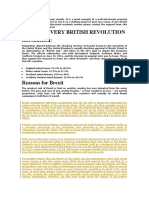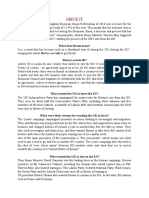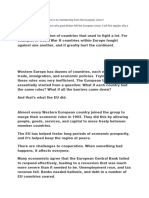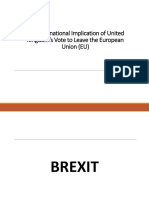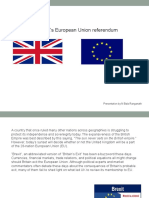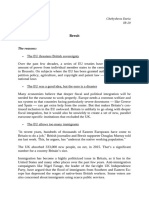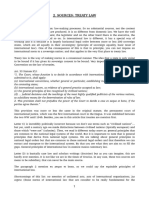What Is Brexit?
Uploaded by
Allyssa DCWhat Is Brexit?
Uploaded by
Allyssa DCWhat is Brexit?
From the two terms “Britain” and “exit,” it is the departure of the United Kingdom from the
European Union (EU). The UK held a referendum on its membership in the EU on the 23rd of
June, of the year 2016, questioning whether “Should they remain or leave the union?” Which
resulted 48.11% votes to remain, however, 51.89% favored to leave the EU. The membership
ended when Great Britain officially left the EU on January 31, 2020, yet allowed a transition
period until December 31 of the same year. This concluded the membership of the state who
have been a part of for 47 years, and is the first and thus far the only country to exit.
What are the reasons why Brexit happened?
Although it seemed as if the ‘anti-migrant movement’ drove Britain to leave the union, in reality,
there were many factors including sovereignty, immigration, the economy, and demographic
and cultural factors that influenced the withdrawal of the state. Let’s discuss each one by one.
Sovereignty
On the day of the referendum, Lord Ashcroft had questioned 12,369 people who had
participated in the voting, which concluded a data that showed that the primary reason for
wanting to leave the European Union was "the principle that decisions about the UK should be
taken in the UK". Denoting that, rather than leaving the decision-making favorable to its people,
it was the EU that took that right away because they are the leading governing body. Pro-Brexit
Labour MP Kate Hoey said that the EU was “an attempt to replace the democratic
power of the people with a permanent administration in the interests of big business”.
Immigration
On the same poll, it was also magnified how the resentment for migrants heavily prompted the
decision, 33% had said that leaving "offered the best chance for the UK to regain control over
immigration and its borders." EU guaranteed the free movement of any EU citizen within its
member states to travel, live, and take jobs without requiring a VISA, subsequently resulting in
poorer countries like Poland and Lithuania to have flocked to the UK for employment. Anti-
immigration campaigners like Nigel Farage, the leader of the UK Independence Party, have
argued that the flood of immigrants from Southern and Eastern Europe has depressed the
wages of native-born British workers. Some voters are also concerned about immigrants using
scarce public services.
Economy
Brexit supporters viewed that it will open opportunities for Britain to become freer in terms of
market and trade. It was argued that being away from EU regulations would boost Britain as a
market, because as critic Johnson says, some of its policies are increasingly troublesome. It
prohibits the state to have freedom and to function independently, becoming EU-central and
often overlaps with national laws. This also means that UK would have in an immediate cost-
saving, as the country would no longer contribute to the EU budget.
Demographic and cultural factors
Among other countries, United Kingdom is often deemed detached from the union. Being an
island country with few shared land borders, how the UK didn’t adopt Europe’s common
currency which is the euro, as well as their own patterns and practices shows they were the
least Europeanized. Additionally, being dubbed as “an awkward partner” in Europe because of
their hesitancy to fully integrate themselves. Using data from the Eurobarometer survey they
showed that fewer Britons considered themselves European than any other EU nationality,
resulting in voters feeling as if the membership undermine their identity.
Is it beneficial or prejudicial?
With 28—now 27, member states of the campaign that have broadly contrasting and diverse
goals and interests, it is less likely for the EU to bring forth a universal system. What may
succeed in one state, can be the downfall for other. Thus, my stance is that it is beneficial. In my
personal take, I think UK’s main agenda for leaving was seeking freedom from the regulations of
the EU, towards wider global market access. It can be seen that the EU threatens British
sovereignty. With their exit, it will allow them to reinstate the powers to where they should
belong, which is their own government and their own people. They can have the full authority to
make amendments to policies that didn’t work for Britain. Besides this, the EU allows too many
migrants. Brexit permits them to control those who stay and work within the country. Up to
500,000 people move to the UK each year that housing became a big problem. It eliminates
illegal workers and those from other EU countries who continuously reap the resources and
benefits coming from the shore of Britain, hence they get to implement their own immigration
laws. In retrospect, we can’t deny that the United Kingdom will only gain with Brexit, there are
undoubtedly many regretful things that they can lose. However, it is still too early to recognize
whether or not it does truly contribute to the greater good, the ending of the partnership could be
a start of a more progressive state and growth for Britain.
References:
Wikipedia contributors. (2021, May 9). Causes of the vote in favour of Brexit. Wikipedia.
https://en.wikipedia.org/wiki/Causes_of_the_vote_in_favour_of_Brexit
Lee, T. B. (2016, June 25). Brexit: the 7 most important arguments for Britain to leave
the EU. Vox. https://www.vox.com/2016/6/22/11992106/brexit-arguments
You might also like
- The Causes and Effects of Brexit Final Paper100% (1)The Causes and Effects of Brexit Final Paper19 pages
- Module #3 RPH ACTIVITY 1: Juan de Plasencia's Customs of The TagalogsNo ratings yetModule #3 RPH ACTIVITY 1: Juan de Plasencia's Customs of The Tagalogs1 page
- The Compelling Reasons For The Britain'S Exit From The European UnionNo ratings yetThe Compelling Reasons For The Britain'S Exit From The European Union11 pages
- The Causes and Effects of BREXIT On The Global Economy.100% (7)The Causes and Effects of BREXIT On The Global Economy.26 pages
- What Is Brexit?: When Will Brexit Happen?No ratings yetWhat Is Brexit?: When Will Brexit Happen?2 pages
- Brexit - An Analysis: Why UK Wanted To Leave? - The Background HistoryNo ratings yetBrexit - An Analysis: Why UK Wanted To Leave? - The Background History5 pages
- Brexit and Economy: Business Economics AssignmentNo ratings yetBrexit and Economy: Business Economics Assignment10 pages
- (Report) Brexit INTER ECONOMIC INTEFRATIONNo ratings yet(Report) Brexit INTER ECONOMIC INTEFRATION18 pages
- Clean Brexit: Why Leaving the EU Still Makes Sense - Building a Post-Brexit Economy for AllFrom EverandClean Brexit: Why Leaving the EU Still Makes Sense - Building a Post-Brexit Economy for All5/5 (1)
- The International Implication of United Kingdom's Vote To Leave The European Union (EU)No ratings yetThe International Implication of United Kingdom's Vote To Leave The European Union (EU)18 pages
- What Are The Consequences On The UK After Withdrawing From The European Union?No ratings yetWhat Are The Consequences On The UK After Withdrawing From The European Union?12 pages
- Brexit - The UK's European Union Referendum: Presentation by N Bala RanganathNo ratings yetBrexit - The UK's European Union Referendum: Presentation by N Bala Ranganath15 pages
- Brexit-British Exit: What Is EU & Its Purpose ?No ratings yetBrexit-British Exit: What Is EU & Its Purpose ?3 pages
- Brexit Birle Ik Krall K Ve T Rkiye Zerinde Etkisi (#407768) - 468672No ratings yetBrexit Birle Ik Krall K Ve T Rkiye Zerinde Etkisi (#407768) - 46867210 pages
- BREXIT: Something of A Political Earthquake On June 23, 2016No ratings yetBREXIT: Something of A Political Earthquake On June 23, 20163 pages
- UK Ireland Points of View Reference Centre Topic Brexit UKNo ratings yetUK Ireland Points of View Reference Centre Topic Brexit UK10 pages
- Implications of Brexit Revision Notes: BackgroundNo ratings yetImplications of Brexit Revision Notes: Background3 pages
- British Disillusionment With The European Union (BREXIT)No ratings yetBritish Disillusionment With The European Union (BREXIT)2 pages
- Impact of BREXIT On Global Economy Course Code: BUS-503: Prepared ForNo ratings yetImpact of BREXIT On Global Economy Course Code: BUS-503: Prepared For10 pages
- One Sample Test: Assuming Equal VariancesNo ratings yetOne Sample Test: Assuming Equal Variances1 page
- T-Test: Psychological Statistics Prof. Meg Ferrer, RPMNo ratings yetT-Test: Psychological Statistics Prof. Meg Ferrer, RPM20 pages
- Brexit Impact in The Uk - Economics For Business PresentationNo ratings yetBrexit Impact in The Uk - Economics For Business Presentation3 pages
- Brexit Readiness Checklist' For Companies Doing Business With The UkNo ratings yetBrexit Readiness Checklist' For Companies Doing Business With The Uk6 pages
- Chapter 2 - Closing Case Emerging Markets Ethical Dilemma DemocracyNo ratings yetChapter 2 - Closing Case Emerging Markets Ethical Dilemma Democracy2 pages
- After Brexit: Consequences for the European Union 1st Edition Nazaré Da Costa Cabral download pdf100% (5)After Brexit: Consequences for the European Union 1st Edition Nazaré Da Costa Cabral download pdf65 pages
- Hanoi Pedagogical University 2 (Trường Đại học Sư phạm Hà Nội 2) Hanoi Pedagogical University 2 (Trường Đại học Sư phạm Hà Nội 2)No ratings yetHanoi Pedagogical University 2 (Trường Đại học Sư phạm Hà Nội 2) Hanoi Pedagogical University 2 (Trường Đại học Sư phạm Hà Nội 2)103 pages
- Taking Back Control - Investigating The Role of Immigration in The 2016 Vote For BrexitNo ratings yetTaking Back Control - Investigating The Role of Immigration in The 2016 Vote For Brexit15 pages
- EAPP Q1 W3 Thesis Statement Jeanilyn Colal Bgo v1No ratings yetEAPP Q1 W3 Thesis Statement Jeanilyn Colal Bgo v115 pages
- Rightmove House Price Index 16 September London 2019No ratings yetRightmove House Price Index 16 September London 20196 pages
- PDF Euroscepticism and the Future of European Integration Catherine E. De Vries download100% (10)PDF Euroscepticism and the Future of European Integration Catherine E. De Vries download66 pages






